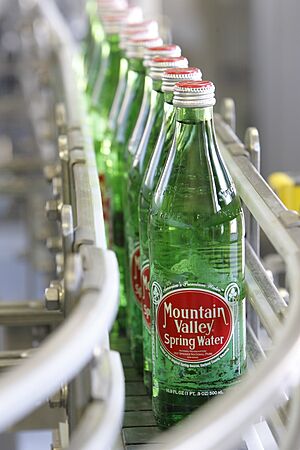Mountain Valley Spring Water facts for kids
Mountain Valley Spring Water is a famous brand of bottled water from Hot Springs, Arkansas in the United States. This special water has been bottled and sold since 1871. Today, it is owned by Primo Water and is enjoyed by people all across the country.
Contents
The Story of Mountain Valley Water
How It All Began
The journey of Mountain Valley water starts from a protected spring near Hot Springs, Arkansas. In 1871, two brothers, Peter and John Greene, were the first to sell this water. At first, people called it "Lockett's Spring Water." The brothers soon renamed it "Mountain Valley" after a small community nearby.
In 1883, the Mountain Valley Water Company officially began. Peter Greene continued to manage the local operations.
Growing Across the Country
In 1902, the Schlafly family from St. Louis, Missouri, became the sole owners of the company. By 1908, Mountain Valley Water had opened offices in big cities like Chicago, Illinois, and New York City.
By the 1920s, this water was even served in the United States Senate. In 1928, it became the first bottled water to be sold all the way from one coast of America to the other, reaching California.
In 1924, the Schlafly family bought another water company called DeSoto Springs Mineral Water. Its building in Hot Springs later became the national headquarters and visitor center for Mountain Valley Water in 1936.
Changes in Ownership
In 1966, the Schlafly family sold the company. The main office moved to Paramus, New Jersey, for a while. But in 1987, a company from Dallas, Texas, bought Mountain Valley and brought its main operations back to Hot Springs.
In 2004, the company was sold again. Then, in 2018, DS Services, which is part of Cott Corporation, bought the company. Cott Corporation later changed its name to Primo Water Corporation. So, today, Mountain Valley Spring Water is part of Primo Water.
Awards and Recognition
Mountain Valley is known as America's most-awarded spring water. It has won many honors from the Berkeley Springs International Water Tasting, which started in 1991.
- 1997: Won 1st place (tied) for Bottled Non-Carbonated Spring Water.
- 2003: Received the Gold Medal for Bottled Non-Carbonated Water.
- 2008: Placed 5th for its Vintage Glass bottle design in the People's Choice Package Design.
- 2011: Earned the Silver Medal for Carbonated Bottled Water.
- 2018: Placed 2nd for Best Bottled Water.
- 2019: Won 1st place for Mountain Valley Blackberry Pomegranate Sparkling Water in the Best Flavored Essence Sparkling category. It also won 1st place for its regular Sparkling Spring Water.
- 2020: Placed 3rd for both its Sparkling Spring Water and Blackberry Pomegranate Sparkling Water.
- 2021: Placed 5th (tied) for its Sparkling Spring Water.
Famous Fans
Mountain Valley Spring and Sparkling Waters are the official bottled waters for groups like the Southern Foodways Alliance.
Many important people have enjoyed Mountain Valley Spring Water. Every United States President from Calvin Coolidge to Bill Clinton served it in the White House. After a health issue in 1955, President Dwight Eisenhower drank the water because his doctor suggested it.
Other famous people who liked the water include Elvis Presley and boxing champions like Joe Louis and Sugar Ray Robinson. It's not just humans who enjoy it! Famous racehorses like Secretariat and Nashua also drank this spring water as part of their training.
 | John T. Biggers |
 | Thomas Blackshear |
 | Mark Bradford |
 | Beverly Buchanan |


